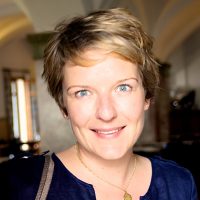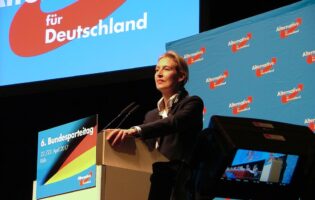Playing the European Power Game

Almut Möller
European Policy Centre
Almut Möller joined the EPC as Director for European and Global Affairs and Head of the Europe in the World programme in July 2024. She is a political scientist with professional experience in both think tanks and government. Her areas of expertise include EU institutions and politics, foreign and security policy, and multilevel governance, and she has published widely in these fields.
Prior to joining the EPC, she served as State Secretary and Plenipotentiary of the Free and Hanseatic City of Hamburg (2019-2024), representing the city state in Berlin, and at the European Union. In that capacity, she oversaw both the Berlin and Brussels representation offices and was a member of the Conference of Europe Ministers of the German Länder. She was also in charge of Hamburg's international relations, and the point of contact for the diplomatic and consular corps.
Before that, Almut was the Head of the Berlin office of the European Council on Foreign Relations (2015-2019), headed the Europe program at the German Council on Foreign Relations (2010-2015), and worked as an independent political analyst based in London (2008-2010). She started her career in think tanks as a researcher at the Centre for Applied Policy Research (C.A.P) at Ludwig-Maximilians-Universität in Munich (1999-2008).
Almut was a guest researcher at Renmin University of China in Beijing (2006), Al Ahram Center for Political and Strategic Studies in Cairo (2007), and at the American-German Institute (AGI) at Johns Hopkins University in Washington D.C. (2008).
She was a 2016-2017 participant in AICGS’ project “A German-American Dialogue of the Next Generation: Global Responsibility, Joint Engagement,” sponsored by the Transatlantik-Programm der Bundesrepublik Deutschland aus Mitteln des European Recovery Program (ERP) des Bundesministeriums für Wirtschaft und Energie (BMWi).
AGI is pleased to present this collection of essays reflecting on the 25th anniversary of German unification in October 2015. We are grateful to those who have contributed to this collection, all of whom have been affiliated with and supported the Institute in many different capacities. These essays leave us with thoughts not only about the past, but also about the future of German-American relations. Be sure to check back throughout the week for additional insights.
Germany, united: In 1989, the people of Berlin celebrated the collapse of the Berlin Wall after over 40 years of division. A breathtaking year later, Germany stood on the international stage as a unified country embarking on a new journey to rediscover and redefine its role in international relations.
A new force in the heart of Europe that U.S. engagement on the continent helped to bring about, Germany soon found itself deeply involved in the dynamics that started to unfold within the European Union (then European Community). Tamed by its partners through a commitment to build a joint currency, the euro, Germany became a leading voice in calls to strengthen European integration, and a strong advocate of EU enlargement to Central and Eastern Europe.
The deepening of the Community into a Union through successive treaty reforms adopted in Maastricht, Amsterdam, Nice, and Lisbon went hand in hand with its widening from 12 to today’s 28 members. And with the European Union developing into the umbrella under which a whole continent has worked toward, for most of the past quarter of a century, Germany was seen to become more European than ever. Bonn—and later Berlin—was a trusted partner because of a strong and visible commitment to building EU institutions in which countries shared national sovereignty, and whereby the old power question in Europe was mitigated. This was a Union built on shared rules and institutions codified in treaties—a “Rechtsgemeinschaft.”
This was perhaps a very German understanding of an ultimately very political project, but one that allowed Germany to find its place as by far the largest member state, despite being a country with a gloomy record of destruction in Europe. In this kind of Union, Germany was a communal player. This Union, then, found its sudden end with the global banking and financial crisis hitting the EU’s economies in 2010. Ever since, the question of power has returned with force to the conference table: size and economic clout matter in today’s European Union, and Berlin has found itself in a rather exceptional position of strength over the past years. “Germany is calling the shots” has become a major issue of controversy within the Union, and publications on “the new German question” are filling bookshelves.
Interestingly, for the battered German-U.S. relationship, this is rather good news. Much of today’s commentary on German-American relations highlights the extent to which Germany and the U.S. have been drifting apart over the past years, over both fundamental values and policies.
But, ironically, the new Union with Germany at its heart is perhaps much more accessible to U.S. thinking than is widely assumed. It has, in fact, made Germany more like the U.S. (used to being the elephant), and EU policymaking following a political rather than a bureaucratic logic is also more easily understood on the other side of the Atlantic.
In conversations with U.S. colleagues one often felt the challenge of portraying the inner logic of the European idea—i.e., power shared in joint institutions—as an appealing model in a country whose political culture is comfortable with the notion of power. Now, with Germany experiencing what has been called its “unipolar moment” (and the U.S.’ decline as the only world power), there is new ground for joint understanding.
Today’s EU is one of politics rather than of diplomacy; its reform agenda is no longer negotiated merely around conference tables by governments and officials, but with a focus on national and, though less so, European constituencies. This has so far placed Germany in a position of unique strength as it increasingly plays the European power game.
In this regard, Washington and Berlin are perhaps closer to each other today than before 1990. However, this experience of strength has not made the U.S. and Germany converge in their outlook on the world—on the contrary. And looking at the inner workings of the EU, this development has not done the Union good either. While Germans are getting used to their own country’s power, there is a growing and sometimes open resentment, even hostility, within parts of the EU toward what is perceived as a “German dictate.” This is playing out in major areas of joint policy, i.e., economic and monetary policy, and, lately, in refugee policy.
The way Germany is perceived in these formative times for the Union will determine how other EU members and European citizens will look at it in years, perhaps decades, to come. This, however, is not a thought that seems to come naturally to Berlin’s policy community. Twenty-five years into reunification, Germany’s journey onto the international stage is not yet over. And it has become a bumpier ride than many will have hoped for a quarter of a century ago.
Almut Möller is a senior policy fellow and head of the Berlin office of the European Council on Foreign Relations (ECFR). From 2010-2015 she directed the Alfred von Oppenheim Center for European Policy Studies at the German Council on Foreign Relations (DGAP). She is a Non-Resident Fellow at AGI.








